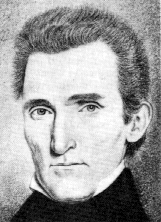Robert Lucas (governor)
| Robert Lucas | |
|---|---|
 |
|
| 1st Governor of Iowa Territory | |
|
In office August 15, 1838 – May 13, 1841 |
|
| Preceded by |
William B. Conway (acting Governor) |
| Succeeded by | John Chambers |
| 12th Governor of Ohio | |
|
In office December 7, 1832 – December 12, 1836 |
|
| Preceded by | Duncan McArthur |
| Succeeded by | Joseph Vance |
| 11th and 15th Speaker of the Senate of Ohio | |
|
In office December 7, 1818 – December 5, 1819 |
|
| Preceded by | Abraham Shepherd |
| Succeeded by | Allen Trimble |
|
In office December 7, 1829 – December 5, 1830 |
|
| Preceded by | Samuel Wheeler |
| Succeeded by | Samuel R. Miller |
| Member of the Ohio Senate from Gallia, Scioto, Pike, Lawrence and Jackson | |
|
In office 1814–1822 |
|
| Preceded by | Lewis Summers |
| Succeeded by | William Kendall |
|
In office 1824–1828 |
|
| Member of the Ohio House of Representatives | |
|
In office 1808–1809 |
|
| Personal details | |
| Born |
April 1, 1781 Mecklenburg, Virginia (now Shepherdstown, West Virginia) |
| Died | February 7, 1853 (aged 71) Iowa City, Iowa |
| Political party |
Democratic-Republican Democratic |
| Spouse(s) | Elizabeth Brown (1810), Friendly Ashley Sumner (1816) |
| Children | George W., Napoleon B., Minerva, Sumner, Abigail M., Robert, Susannah, Mary |
| Residence | Piketon, Ohio; Iowa City, Iowa |
| Profession | Surveyor, military officer, farmer |
| Religion | Quaker, Methodist |
Robert Lucas (April 1, 1781 – February 7, 1853) was the 12th Governor of the U.S. state of Ohio, serving from 1832 to 1836. He served as the first Governor of Iowa Territory from 1838 to 1841.
Lucas was born in 1781 in what was then Mecklenburg, Virginia (his birthplace's location in modern times is known as Shepherdstown, West Virginia). He was the son of William Lucas and Susannah Barnes. Lucas came from a Quaker family whose roots stretched back to 1679 in Pennsylvania, though the family had recently relocated to Virginia.
Lucas' father, an American Revolutionary War veteran, owned slaves and large amounts of land. According to family legend, Robert's uncle, Joseph Barnes, built a steam-powered boat long before Fulton's invention. Robert received some early schooling in mathematics and surveying, skills which would prove invaluable to his future work.
Around the age of nineteen, Lucas moved to the Scioto Valley of the Northwest Territory, now Ohio. He was preceded by other family members, including two older brothers and a cousin. One brother would later become a general, while his other brother and his cousin would become Ohio legislators. The family bought large parcels of land; eventually the nearby town of Lucas was named for them. For his skill in recruiting troops for the Army during the increasing hostilities between England, France, and the U.S., Robert Lucas was made Captain in 1807. He was elected to the Ohio General Assembly for the first time in 1808 as a member of the Ohio House of Representatives. He was married to Elizabeth Brown, his landlord's daughter, in 1810. Lucas and his wife had a daughter, Minerva, in 1811. Through complex political maneuvering, Lucas was made a Brigadier General in 1810.
Lucas served in the War of 1812 and was famous for his resourcefulness and calm in an increasingly chaotic campaign. As one of his contemporaries stated, "As a spy he was productive and brave — as a soldier he had no superior."
Lucas rose to national prominence during the court-martial trial of General William Hull. Hull was accused of incompetence in the loss of Detroit and the Michigan Territory to the British in June 1812, and the journals Lucas kept during the campaign were used as evidence to convict Hull.
...
Wikipedia
